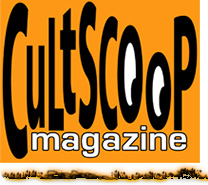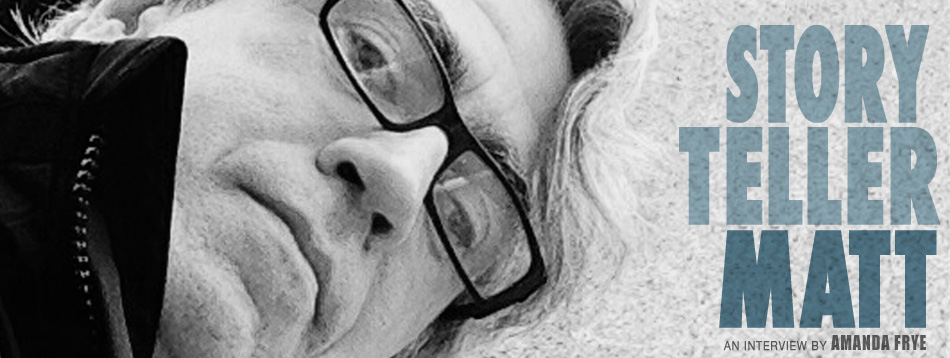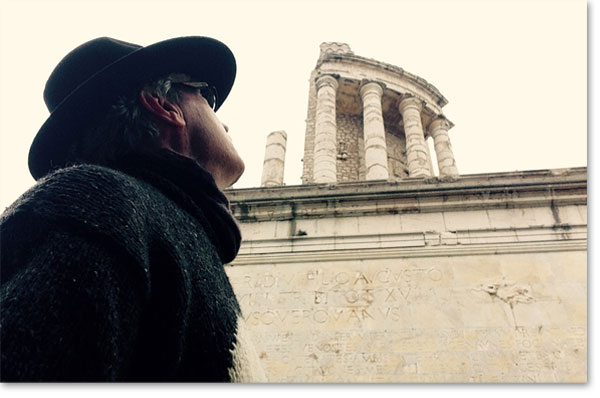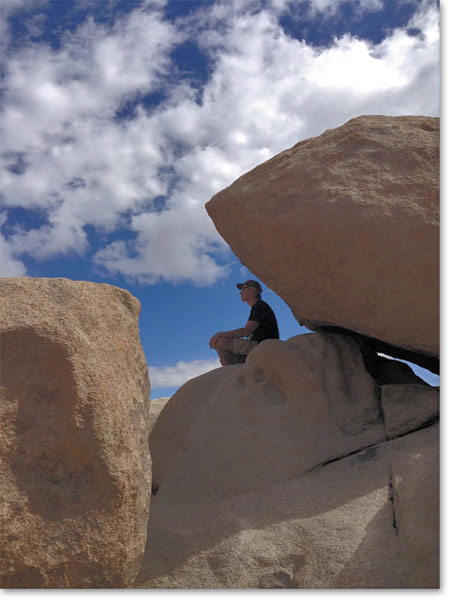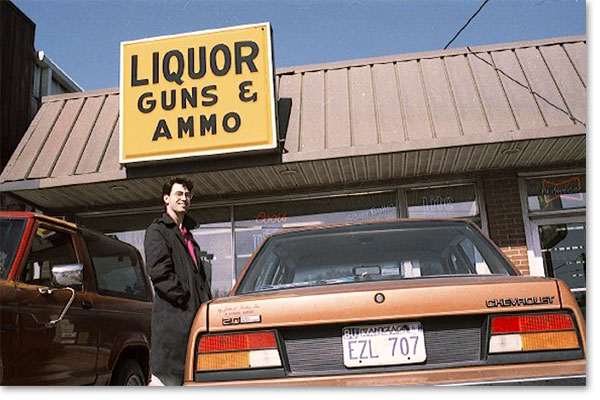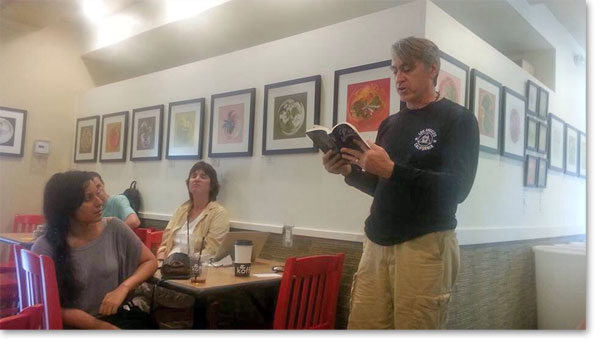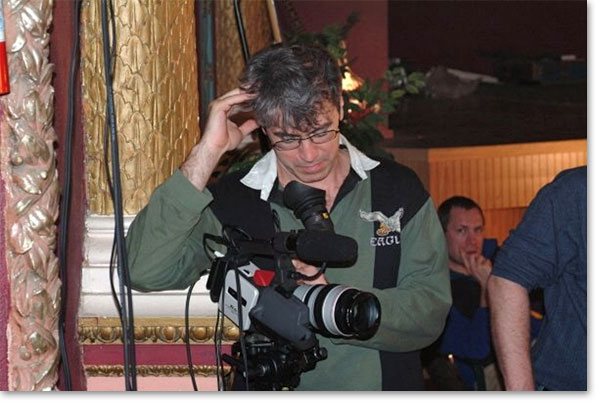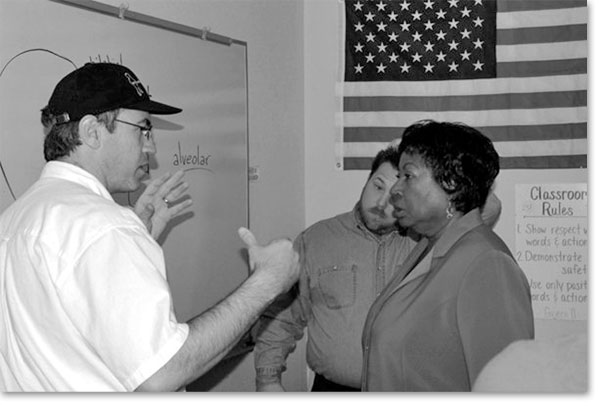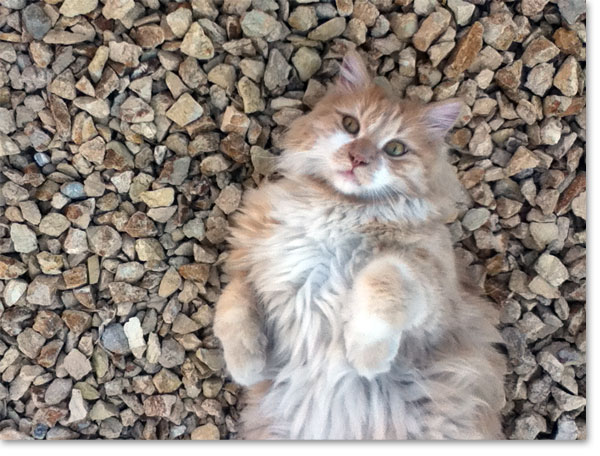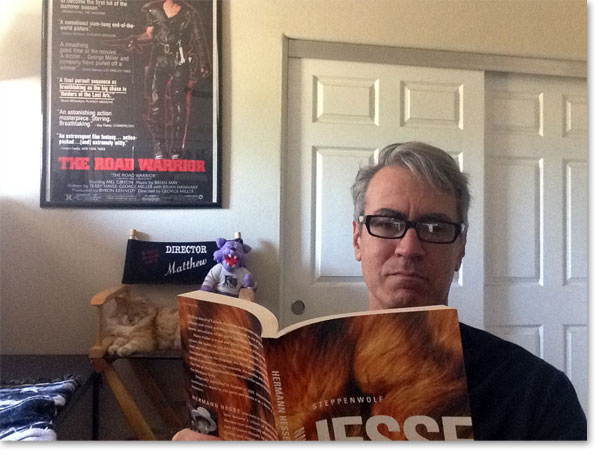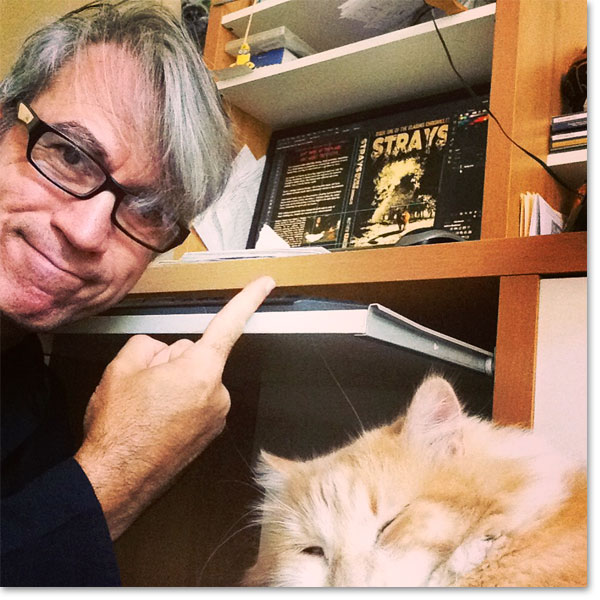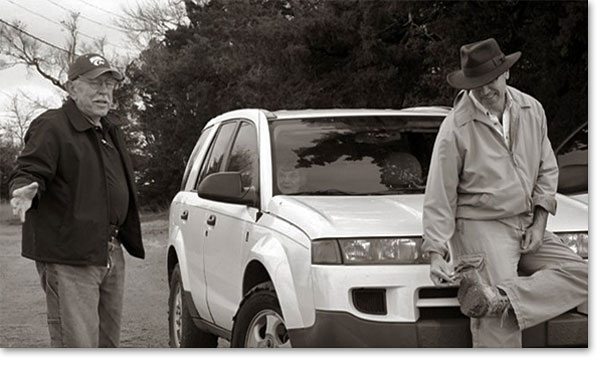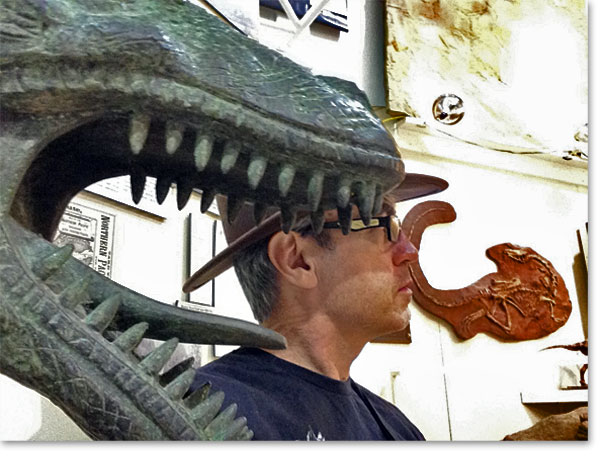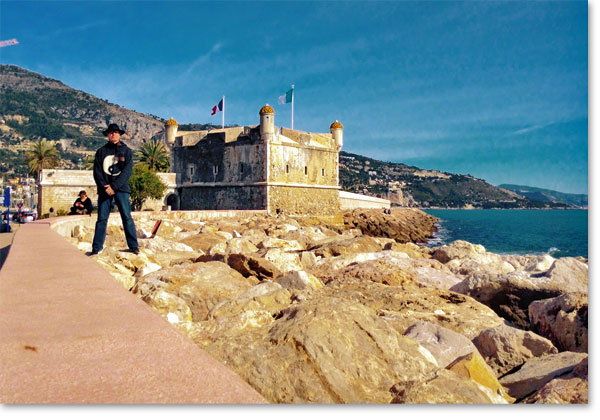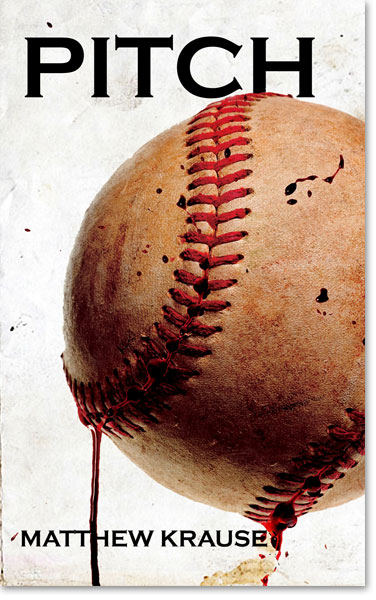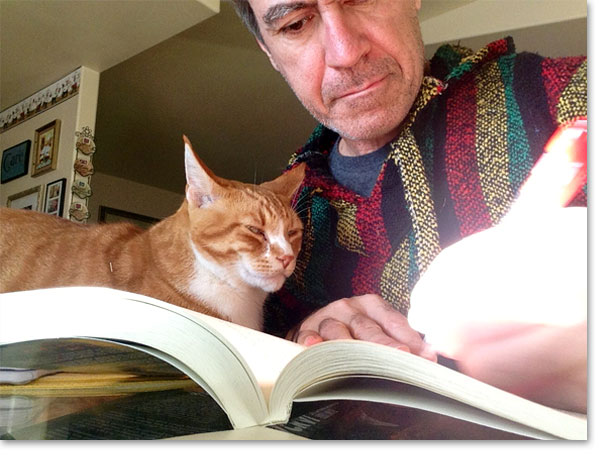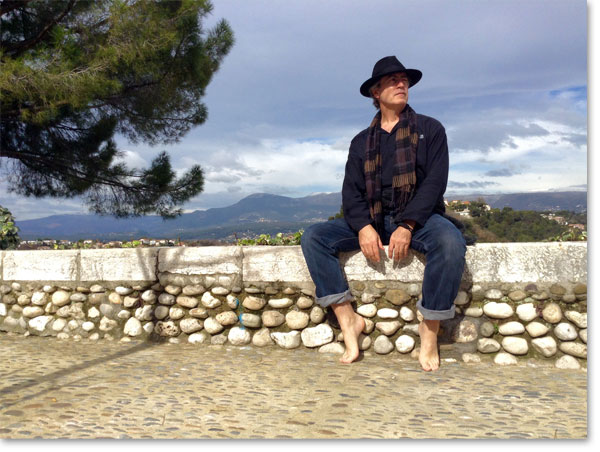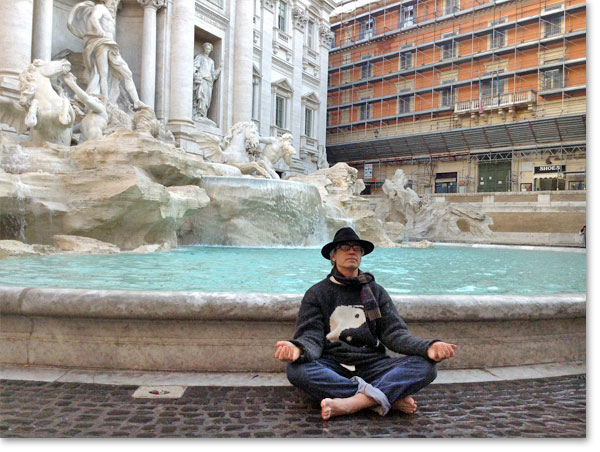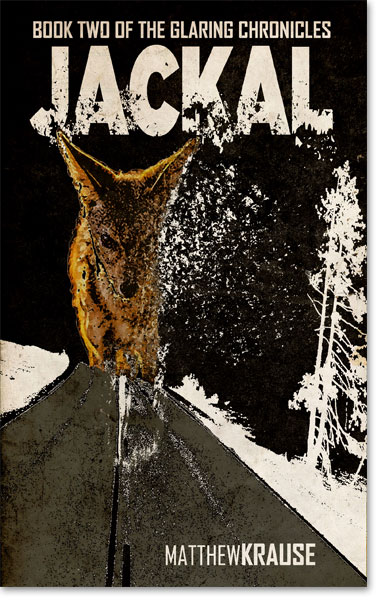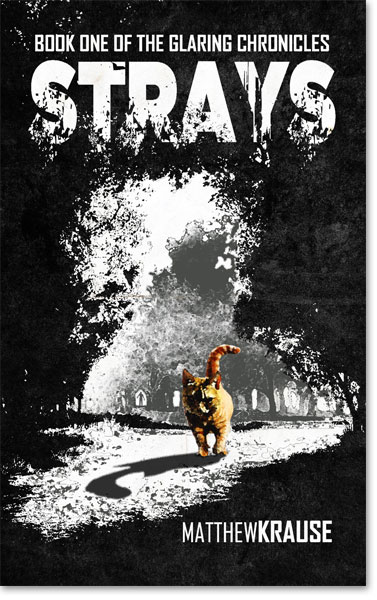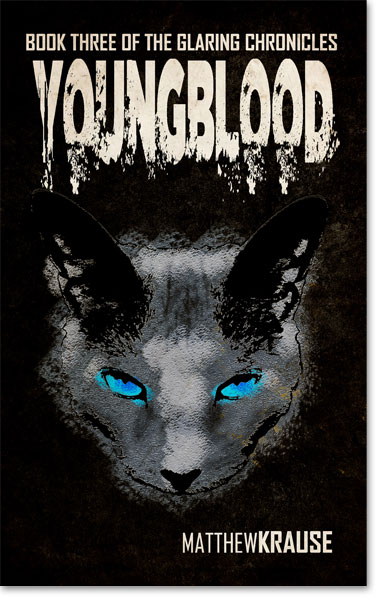|
||||||||||||||||||||||||||||||||||||||||||||||||||||||||||||||||||||||||||||||||||||||||||||||||||||||||||||||||||||||||||||||||||||||||||||||||||||||||||||||||
|
MATT KRAUSE: I was eleven or twelve years old, I think, and it was summer, so we're talking 1974 or '75, and I used to go to the local drug store to buy paperbacks with my paper route money. One day, I found a book called THE ILLUSTRATED MAN by Ray Bradbury, a bunch of weird short stories set within a metanarrative of a man with tattoos all over his body. I remember sitting in my parents' living room reading the stories in THE ILLUSTRATED MAN and just getting lost. I got so lost, in fact, that when my Dad walked in and talked to me, I had to look up and sort of blink to remember where I was. The stories had pulled me in so deep into their universe that for a time I had forgotten my reality. That was the point, I think, that I decided I wanted to do the same thing to other people, to use words to create alternative worlds for them that would yank them out of their lives for a while. AF: Matt you grew up in a small town in Kansas where your family's home was blocks away from the public library. You matriculated at Emporia State University and then pursued a Master's Degree at Kansas State University. How did growing up in the Midwest impact and shape you as an author?
MK: One of the things about small towns when I was growing up was the way the people who lived there used the town's remoteness to sustain an unspoken set of rules. A child is born, and based on whether or not it is male or female determined what the adults were going to do with it. Boys play sports, girls sit in the stands, boys hunt and take Woodshop, girls go shopping and take Home Ec., that sort of thing. We were also all expected to believe in the same God and embrace a homogenized version of democracy. We were taught that homosexuality was an "abomination." I use those last examples because one of my favorite writers today is an Italian poet and filmmaker named Pier Paolo Pasolini, who was an atheist, a Marxist, and a homosexual. I like to joke that if he had lived in my hometown in the 1970s, we would not be allowed to be friends. But at the same time, there were good things about small-town living. You realize this during crises like tornadoes and floods. Everyone comes together and has each other's back. I also have fond memories of the sense of security I felt walking the streets. I used to deliver papers early in the morning before anyone else was up, and I never feared for my safety. I always felt that the town had my back. But I never felt like I belonged. I didn't play sports. The first time I went hunting with my father—a boy's rite of passage in rural America—I freaked out while watching a pheasant dying at my feet and never hunted again. As such, I received a lot of mixed messages from my small-town culture, messages about what it meant to be a man and how I was falling well short of that. No one outright said "You are not a man" or "You will never be a man," but as an example, I had a cool older brother who, to me, was the epitome of what a man looked like… talented athlete, hunter, good at building things, and handsome. A lot of the girls in my class had a crush on him, and for some reason, they used to say to me, "You will never be like your brother," which is the same as saying, "You will never be a man." I don't hold this against them. They were just insecure kids being mean to compensate. But that message sunk in and is one of many reasons why it took me a while to find my place in the world.
And I don't think I'm unique. I think a lot of people receive those messages growing up, whether they live in a small town or a big city. Young girls get these messages too, basically someone else's idea of what a woman looks like and how they will never measure up. So to get back to the question, I guess this upbringing impacted me in that the focus of all my work is about that sense of inadequacy and isolation that we all feel. A lot of my male protagonists are weak at the outset and must discover their inner reserves of strength. In contrast, my female protagonists seem to be wiser and stronger, because that's the kind of woman I was drawn to growing up. Even in my nonfiction work, I tend to focus on those rules of masculinity and how I still have to decipher them today because they are constantly being rewritten. AF: You are an award winning author and screenwriter. "Story Teller Matt" is the moniker you have chosen. Describe "Story Teller Matt." MK: When I was in Los Angeles pitching my work to producers, I printed up some inexpensive business cards that just listed "Screenwriter" as my title.
When I started branching out, writing stories and novels, trying to produce and direct, and so on, I listed all of these titles—"Novelist," "Producer," "Director,"—below "Screenwriter" on my card. I thought it would impress people, but it just looked like a mess. Then my wife suggested I just consolidate it under one heading of "Storyteller," since that is ultimately what screenwriters and novelists and producers and directors all do—they tell stories. So I took her advice, and "Storyteller" is what appeared on the business card after that. There was a time about ten years ago when my card was unique, and producers who looked at it would comment on the originality of truncating my title to "Storyteller." Now, it seems, everyone is using "Storyteller" on their blogs and business cards, so I'm not so unique anymore. I did meet an artist, however, whose title in his business card is simply "Creative Mother Fucker," so maybe that's the next way to go. AF: Your website is a creative endeavor to delight all who visit with fun cartoon caricatures, videos, blogs, and more. The website provides a pleasurable adventure for visitors and easy access to your work. How has the StorytellerMatt.com website evolved?
MK: In the beginning, it was just about the screenplays. In 2010, I was living in Kansas but making trips back to Los Angeles to pitch some of my newer scripts. I wanted to create a place online where I could direct potential producers. After we made the move to the L.A. area in 2012, I started branching out with other projects, specifically my books, and so the website sort of expanded from there. It used to be rather ridiculous, but the more I continued to write, the more I realized that I had something to say, and I needed to take the work itself seriously. So even though I work in a few of my makeshift cartoons to give the site a lighter tone, I want the site to be thoughtful and even a bit contemplative, particularly in the blog. Which reminds me, I am way behind on that blog and need to get a new post in soon. AF: Writing is creative process. Can you describe your process? Where do you find inspiration for your ideas? Do you ever have "writers block" and how do you get past that? Do you maintain a schedule, work round the clock to complete an idea etc.?
MK: I have come across literally hundreds of blogs by various writers in which they outline the "rules," for want of a better term, for writers. According to these blogs, a so-called "real" writer writes on this schedule or that schedule, and outlines his or her work a certain way, and utilizes specific tools a specific way. I don't think any of these blogs have the best all-encompassing answer for a writer. Really, all each blog is saying is, "This is the process that works for me." Here is my process: There is no process. I don't keep a schedule, but I write every day. I don't have a word goal for those days, and as I am usually juggling at least two projects, I never know which one I am going to approach from one day to the next. My day job is a corporate gig that I get to do from home, so that gives me more time to write, but I don't rise early or stay up late. I keep my laptop open because inspiration comes at the oddest moments. When my days on my "real" job are slow, I work in between calls. It does not sound like an ideal writing situation to most people, but that is how I get my first drafts down. Once that draft is completed, however, then the real work begins. Then I am spending my days off poring over the work with a red pen, a process I call "bleeding out" the prose, and figuring out how to bring order to the whole. But those early drafts, man… they are a free-for-all, literally a "by any means necessary" kind of deal. AF: Hank Moody is your sidekick? Tell me about Hank.
MK: When I lived in the California desert, this cream-colored longhair cat showed up at our house one day, malnourished, filthy, and traumatized. We soon figured out that he was a foreclosure cat. His original owners had previously lived in the house we were renting, but they had left him behind when they were evicted. We took the poor little guy in, of course. He was five years old, and he had not been neutered, and as such he sprayed everywhere, but we were patient. We got him fixed, and we fed him, and he stayed in my office so as not to freak out my other cats. Even after getting fixed, he still sprayed, and so I just kept a heavy-duty cleaner in the office to clean up after him. Soon he was integrated with the other cats. I called him Hank Moody after the writer that David Duchovny plays on CALIFORNICATION, and since he liked to spend time in my office, sleeping on a hassock next to my desk, I "hired" him as my writing partner. Which turned out to be a good thing because I seem to get my best inspiration when I am lying on the floor with Hank sleeping on my chest, so I wonder if my ideas aren't really coming from him. AF: STRAYS, JACKALand YOUNGBLOODare a trilogy called THE GLARING CHRONICLES which are available in paperback, eBook (Kindle) and audiobook featuring you the author as the reader. You tease the audience with: "There are 500 million cats in the word, but some of them are not what they seem." Tell me more…
MK: There is a certain irony to this work because at the outset I did not want to write it. The concept was my wife's idea, a simple tale about a species of cat that could shape-shift into human form. The idea excited her, and she wanted to "see that movie," so to speak, so she urged me to write it. I fought her tooth and nail at first. I was dealing with a dying father and in no mood to write what I considered to be a children's story. But she was persistent, so I wrote the first couple of chapters in an attempt to prove to her that the idea wasn't viable. Rather than go the route of a children's story or even a young adult novel, I decided to get hardcore and adult about it. I opened with a teenage runaway named Sarah, a victim of sexual abuse at the hands of her alcoholic stepfather. I spent the whole first chapter describing the Dickensian hell she was raised in, ending just before her father molests her for the first time. In the second chapter, Sarah is a runaway on the streets and alone, and she encounters a cat name Tom, who just happens to be one to these shape-shifting cats called The Glaring. Tom and Sarah become friends… And then a crazy thing happened. I started to fall in love with these characters. And I began introducing more characters, more Glaring cats and a few more human heroes, including a teenage alcoholic named Kyle whose struggles are loosely inspired by my own. Just like that, the story expanded into three books. I'm still not sure how that happened.
One of my writer friends, Robbie Cox, wrote a blog about working on a novel and thinking he knew where it was going, and all of a sudden a dead body just showed up. He did not see it coming and had no intention of writing it in there, but for no damn reason, there was that body. This is what happened to me in The Glaring Chronicles—these crazy shape-shifting cats wanted their story told. My first writing professor used to say this was what happened when you turned characters loose in the House of Fiction. AF: Your website contains a section called Video Essays. Tell me about this endeavor and perhaps discuss your favorite video essay. MK: I used to have an old Mac Pro with high-end editing software from Final Cut, and I loved playing with that. I used to do crazy videos where I acted like an adolescent, and I toyed with some really primitive animation. But then my wife and I got involved with a charity called Cameron Wildlife Aid Fund, which rescues primates from the African bushmeat trade. We flew over to Africa, and I shot some footage and created a twelve-minute informational video called PRIMATE RESCUE: CAMEROON, which raised awareness to the bushmeat crisis and was an effective tool in fundraising. Then I started to take the craft of video production a little more seriously. Another video, which was also quite effective in raising money, was about Honor Flight, a charity that flies retired veterans to Washington D.C. to visit the war memorials. In 2009, I accompanied my father and uncle, both World War II vets, on an Honor Flight, and I made a video about it, and a few members of Honor Flight started using it to attract donors. Ultimately, my father and uncle were honored at a Kansas State football game, since we are all K-State alums, and I tacked that footage onto the end of the video. It was very well-received.
But perhaps my favorite video I made was THE FIELD, which came about when I decided to make a road trip to Dyersville, Iowa, to visit the movie site of FIELD OF DREAMS. When I was editing the film together, I started reflecting on the movie FIELD OF DREAMS and my father and the relationship we had, one that was quite strained when I was drinking but which grew much stronger when I got sober. So I made a thirty-minute movie as a tribute to him. I got the chance to show it to Dad before he died, and it was one of the first times I ever saw him cry. So that was pretty special. AF: GEEK PRAY WALKABOUT is one of your new projects. Where did you get the idea? Is the journey complete or is there more? MK: Oh my, where to begin? It really started as something my wife wanted to do. She had always dreamed of living in France for a few months, but it seemed impossible because of all of our cats. Finally, in 2015, we were going through a rocky patch in our relationship, so she figured that we should do the France thing separately: she would live there for two-and-a-half months while I watched the cats in the States, then I would get my own two-and-a-half months in France while she stayed home with the cats.
The week before she left, I was telling a friend in AA about this experience, and he said, "Sounds like your wife is having her own little EAT PRAY LOVE moment." I told my friend that no, it was nothing like EAT PRAY LOVE and that, in fact, I hated that movie. By the way, I hadn't read Elizabeth Gilbert's book at the time, although I am working on that now. Anyway, the conversation gave me the idea to chronicling the experience in a journal, both my time alone in the States while my wife was traveling and then my time alone in France and Italy. I originally called this project GEEK PRAY WALKABOUT as a satire of Liz Gilbert's book. Liz's title is derived from three countries she visited: Italy, where she ate to excess, India, where she prayed in an Ashram, and Indonesia, where she figured something out about love—I don't know what because I'm still reading the book. My story's title was broken down as follows: First off,GEEK was the period after my wife left and I had the house alone. I sort of went through a second childhood, binging on movies and bad junk food. This was all quite fun for a while until I felt my body and mind rebelling against me. It culminated in a really strange meltdown I had while watching the new STAR WARS, which happened to fall on the anniversary of my father's death. It was terrifying and kind of embarrassing, but it is important to write what scares you, so I detail it in the book.
PRAY was the period where I started taking interest in Buddhism thanks to a podcast someone had recommended. This started while I was still in the States but carried over into my time in France when I walked the Chemin de Nietzsche with my copy of THE TIBETAN BOOK OF THE DEAD. WALKABOUT encompasses all the time in Europe, one of the most transformative experiences I have ever had. I equated it to the indigenous people's walkabout where a boy leaves the tribe and becomes a man. Midway through my time in Europe, I realized that I had been a boy for most of my life, and this was my chance to start becoming a man—a strange thing to realize at age 52. So by the time I returned to the States, I felt altered, more aware of the erroneous ideals of American masculinity and the way I had spent my life trying—and failing—to conform to them. I realized that the wisdom I had gleaned from the whole experience might do certain readers some good, so GEEK PRAY WALKABOUT stopped being satirical and started being a more accurate experience of what I went through. AF: You teamed up with David Cooper to write TWO MEN AND A LITTLE '80S, which takes readers on a "magical tour" of 80's cinema. Tell me about this collaboration and how it came about.
MK: Dave and I became friends in the mid-'80s, and what brought us together was film. As I explain in the intro to that book, he and I were in a class together at Emporia State, and one day he overheard me talking about a B-movie marathon that was playing on Cinemax that evening. He approached me and asked if he could come over to my apartment to watch these movies with me, and to paraphrase CASABLANCA, that evening was the beginning of a beautiful friendship. We ended up spending all our free time together watching movies. And it wasn't just B movies either. We were renting the classics, and digging through a catalog of foreign films that a local mom-'n'-pop video store had made available. That first summer, I think we saw more films than any other summer in my life, and it was through this friendship that both of us discovered some of our favorite directors: Kurosawa, Fellini, Lindsay Anderson, Truffaut, Godard, and—for me, at least—Pasolini. Writing a book together seemed like a logical next step, and we chose the '80s because that era was so influential on both of us. We each wrote twenty essays for a total of forty, and each essay addresses a specific film. Our approach was to contrast the experience of watching these films as half-cocked college boys in the 1980s to the experience of rewatching them as grown men in the 21st Century. What we found was that I tend to be the more sentimental writer, Dave the more analytical, but our writing styles are similar, very conversational in tone, and the people who have read the book say that it's like hanging out with a couple of film geeks talking movies.
AF: Your book PITCH won first place in the 2012 Balboa Press Fiction Contest. Can you share a little bit about PITCH? MK: I first came up with the idea for PITCH in April 1994. I had just quit drinking and started working the 12 Steps of Recovery in Alcoholics Anonymous, and I was kind of a jittery, monkey-minded fool. One day while driving the Kansas Turnpike between my hometown of El Dorado and the town of Emporia where I was working, I wondered what I would look like in ten years or so, provided I could stay clean and sober. Would I be better or worse, stronger or weaker, attractive or repulsive? I then started imagining a previous version of myself, the violent junkyard dog that I became when I was drinking, and wondered what that guy, the practicing alcoholic Matt, would think if he got to meet the future me, a Matt who with long-term sobriety who had gotten his life back. That was how the story of PITCH first took hold, a tale of a time-travel anomaly that allows a violent alcoholic named Pooch Shepherd to go forward in time and see his future sober self. He discovers that his future incarnation no longer goes by the name Pooch but by his given name Nick, and he is active in his community, helping other alcoholics and coaching a little league team for at-risk kids. Pooch, deeming Nick to be weak, sets out to sabotage Nick's life, in essence, trying to destroy his own future. I had a lot of fun with the idea, but I couldn't make it work in 1994 because I was still so new to sobriety. I had no idea what life would look like at ten years sober, so I didn't know how to write about it. As such, I didn't complete the first draft of the book until 2007, and the final draft didn't really come together until 2012, just in time to enter it into Balboa Press's contest. And yes, the inspiration for how to finish the final draft hit me during one of my sessions on the floor with Hank on my chest. So in a way, the moment PITCH found its voice was the moment Hank became my "writing partner." AF: What is the most challenging part about being a writer? What advice do you have for aspiring authors, filmmakers and screenwriters? MK: The only challenging thing for me is finding time to write. Well, that and the fact that I am pretty much writing in my head all the time, and more than a few arguments have broken out because my wife has been telling me something important but I've been too busy frolicking in my imagination to listen. But yes, the biggie for me is fitting writing into my schedule, which I do because for me it is kind of like a drug, and back when I was taking drugs I certainly went to any lengths to get wasted.
As for advice to aspiring writers, the only thing I can say is quit aspiring and start writing. It doesn't matter if it is good or not. The first draft probably won't be very good. But keep doing it. Do it when you can. I personally abhor the idea of scheduling time each day to write because I've gone that route, and invariably something comes up that conflicts with my schedule, and I start skipping an hour here, and hour there, and next thing you know I've gone a day without writing. And that's when it really starts to hurt, and I start beating myself up. So I just prefer to keep my laptop and my notebooks handy and just work when and where I can. That's what seems to work for me. Hell, I wrote one of my best screenplays in a storage closet during a temp job in Los Angeles, so making the words happen by any means necessary has never been an issue for me. AF: Any other projects in the works? MK: Well, there's BABY'S BREATH. That's the screenplay I wrote in the storage closet. Back in 2002, I gave it to an agent, and he said it blew him away, so he took it out on the streets, and two days later I had meetings with ten different production companies who had read the script and loved it. It was my little moment in the sun. The only problem was, nobody wanted to produce it back then because a baby dies in the film. They just wanted to meet the writer. So my wife and I decided to produce the movie ourselves. Which we did. It didn't come out the way I would have liked because while we had a great cast and crew, the guy directing it didn't know what he was doing. He was a good writer but a clumsy director.
He was me, by the way. Well, next thing I know, it is over a decade later, and a filmmaker friend of mine, a guy named Leif Jonker who actually can direct, asked me one day if I had a ghost story screenplay. I handed off BABY'S BREATH to him, and he handed it off to a producer friend named Dillis Hart, and Dillis called me and said he wanted to try to get it produced, but first he wanted it made a bit more contemporary. Also, he said he'd like me to revise it if possible to appeal to women age 18 to 34, since they are a growing demographic of horror fans. So I am rewriting BABY'S BREATH, taking out Jake, the male protagonist of the original, and replacing him with Kaitlyn, a female protagonist. And no, I didn't call her Kaitlyn because of Caitlyn Jenner, a man turned woman, although that's kind of an interesting coincidence. I called her Kaitlyn because the actress who played the baby in the original script was named Kaitlyn. So this rewrite is still in the early draft stages, but it's been a really fun challenge reimagining this story from a feminine perspective. Situations that I originally wrote Jake into now take on an interesting dynamic when I replace Jake with Kaitlyn. Women process information and threats differently than men do, of course, and they have different ways of working through them, so I've had to consult a number of women in my life to make sure I'm telling the story the right way. That's really been a blast.
AF: Anything else? AF: Thank You
|
||||||||||||||||||||||||||||||||||||||||||||||||||||||||||||||||||||||||||||||||||||||||||||||||||||||||||||||||||||||||||||||||||||||||||||||||||||||||||||||||
